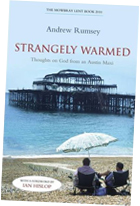| |
|
|
| The pigeon of peace |
 |
January 2002
Call me rash, but when faced with a perilous theological split, it is my custom to try and straddle it, rather in the manner (as I fancy) of Antonio Banderas atop those two bolting steeds in The Mask of Zorro. In so doing I seek to emulate the early fathers of the church, whose knack for rescuing the faith from doctrinal shoot-outs is displayed forever in the great creeds.
The nature of Christ, to take the prime example, was tugged and tussled over in the early centuries AD in such a way as threatened to tear apart his Body on earth. It was pulled to one extreme by the Arians only to be hauled over to the other by the Apollinarians, until reasonable fellows like St Athanasius won the day. Summarising wildly, this is the sort of conversation one would overhear during after-church coffee in Nicea sometime in the 4th century:
Arius: Now listen, don't get stroppy, but Jesus was clearly human, not divine.
Apollinarius: Nonsense, and stop waving your teaspoon at me. The Lord was divine and not really human. And what's more, you know it.
Athanasius (intervening): Guys, guys, hey! In a very real sense, aren't you both right?
This pattern has been rehearsed and repeated so often down the centuries that Hegel decided the law which governed history was this pinball progress of thesis and antithesis eventually leading to synthesis. While I wouldn't go quite this far (universal laws being so 18th century), it certainly seems that the Spirit of Truth, promised by Jesus to his disciples, works in the reconciliation of opposing forces. What us middle-men are prone to forgetting, though, is the vital role of the latter. We can sometimes be not so much the dove of peace, as one of those idiot pigeons who blunder onto the centre court at Wimbledon on finals day.
Reconciliation that smothers with harmony from fear of discord can rarely be an instrument of God in human affairs. Accepting this, let me turn to one current theological divide which doubtless brings fond tears of nostalgia to Athanasius and his heavenly chums. In Arius's sandals we find those who scorn the "ivory tower" theology of the academics, favouring that which arises out of the "real world" of cultural engagement. Those who implicitly don the toga of Apollinarius are scholars who eschew "contextual" theology to reflect in seeming detachment from the outside world.
That such a division persists is apparent from reading Kenneth Leech's latest volume, Through Our Long Exile – an authentic, powerful account of theology being hammered out in the East End of London, rather than "on the moon", which, he suggests, must be the origin of some academic theology. Those looking for proof that the latter has failed to fall to earth certainly won't be discouraged, and every preacher knows that the merest mention of the t-word in an otherwise gripping sermon will cause something like scales to cover the eyes of the faithful.
If the spaceman-theologian is one sort of villain, equally weightless is the one who develops a sort of wide-eyed devotion to "culture" and "context" as if (to change the metaphor) a concrete tower were less in need of redemption than an ivory one.
Too frequently, "build your own" theologies end up as flimsy as prefabs and no great help to you or I in our search for God.
And that is the point, after all. "Liberation", suggests Leech, "lies in theology's fundamental openness to the reality of God," and only the mysterious nature of the Saviour can hope to hold earth and heaven together. For Jesus is, amongst other paradoxes, "the beyond in the midst," and his followers must be as earthy as onions and Godly as grace – that much is clear.
But nothing in the life of Jesus suggests that the reconciliation of these qualities can come from anything less than the agony of the cross. The early church councils that shaped the creeds arose from conflict and offered no soothing smoothing of the boundary between human and divine. Quite the opposite, in fact, for their genius was to insist that in Christ we see no soupy blend of the two, nor the dominance of one over the other, but both in sometimes excruciating tension. Only this can bring the remarkable marriage the Lord called eternal life.
The victory of the cross is the victory of reconciliation – good news for academics and activists alike. So, now that's settled, let's hear no more about it. |
|
|
 |
 |
 |
| Strangely Warmed by Andrew Rumsey is now available as a book. |
 |
 |
 |
 |
 |
| Stephen Tomkins' regular column of tales of religious lunacy from the far reaches of the Net |
 |
 |
 |
| Mark Howe's regular rant about Internet culture |
 |
 |
 |
| Also by Stephen Tomkins... a regular round-up of the saints of yore who were one wafer short of a full communion |
| |
|
|
|
|


